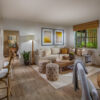
Looking to move to a new apartment? While your focus may be on the cost of rent, make sure you have an accurate snapshot of your expenses, too, by factoring in apartment utility costs. Those will vary based on factors like apartment size, number of occupants, energy-efficient features, and your climate.
Here are some average utility costs … along with a few common-sense tips to help lower your monthly bills.
What Utilities Are Included in Your Lease?
Always read the fine print before signing a year-long lease. For instance, does your rental company factor utilities like sewer into your rent? Many do. If it’s not covered, however, it could add an extra $35 to $60 onto your monthly bills.
Electricity
Keeping the lights on and all your gadgets charged can be pricey. Electricity generally comprises heating, cooling, electronics, appliances, and lighting. If you live in the cooler, windy climate of Northern California, you may have higher heating bills. L.A. residents may use more air conditioning during the city’s balmy summers. Depending on how much space you’re heating and cooling, your electricity bill can run anywhere from $100 to around $150.
Natural Gas
Typical gas-fueled items in your apartment include water heaters, fireplaces, grills, furnaces, gas ranges, and ovens. Your bill will depend on the price of gas and the number of appliances or systems in your apartment that run on natural gas. The average gas bill in California is $65 but can range.
Water
From daily dishwasher runs and evening laundry to regular toilet flushing and long, hot showers, the average U.S. family uses about 300 gallons of water each day, making the average bill around $65 each month.
Cable and Internet
You may have already ditched traditional cable in favor of streaming services, but your internet costs will still vary widely, depending on your speed and connection type. Generally, you’ll be looking at $40 to $100 per month. Add another $40 to $100 if you want to keep traditional cable.
 Money-Saving Tips
Money-Saving Tips
There are plenty of common-sense measures to help reduce your monthly living expenses:
- Unplug appliances and electronics when not in use.
- Adjust your thermostat when leaving the apartment.
- Look for cost-saving bundles or seasonal promotions for internet and cable.
- Use ceiling fans to reduce cooling costs.
- Replace incandescent light bulbs with fluorescents or LEDs.
- Watch water use. Turn off the sink while brushing your teeth, and take shorter showers.
- Turn off lights when not in use.
- Maintain your appliances. Dirty filters and clogged vents cause your dryer to use more energy.
- Run your washing machine or dishwasher either early a.m. or late p.m. when energy costs are cheaper.

 Money-Saving Tips
Money-Saving Tips 





